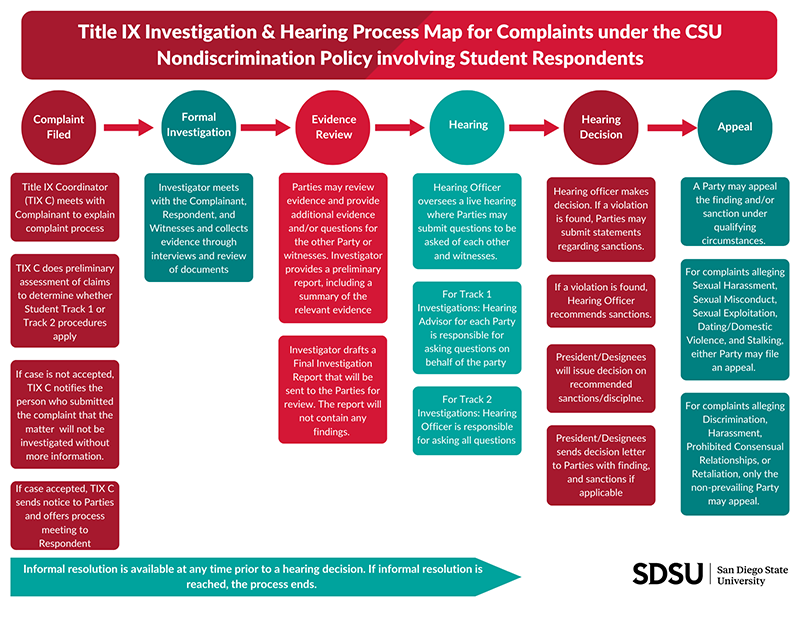Title IX Formal Complaint Resolution Process
The investigation and resolution of complaints is not intended to be an adversarial process between the parties. It is meant to provide an opportunity for the University to: (1) educate students, (2) provide an environment free from prohibited conduct under the Interim CSU Nondiscrimination Policy, and (2) comply with its legal obligations. SDSU is committed to treating all parties equitably while providing for adequate, reliable, and impartial investigation of complaints.
 Open the image full screen.
Open the image full screen.The Process
- Complaint Filed
- Title IX Coordinator (TIX C) meets with Complainant to explain complaint process.
- TIX C does preliminary assessment of claims to determine whether Student Track 1 or Track 2 procedures apply
- If case not accepted. TIX C notifies the person who submitted the complaint that the matter will not be investigated without more information.
- If case accepted, TIX C sends notice to Parties and offers meeting to Respondent.
- Formal Investigation
- Investigator meets with the Complainant, Respondent, Witnesses and collects evidence through interviews and review of documents.
- Evidence Review
- Parties may review evidence and provide additional evidence and/or questions for the other Party or witnesses. Investigator provides a preliminary report, including a summary of the relevant evidence.
- Investigator drafts a Final Investigation Report that will be sent to the Parties for review. The report will not contain any findings.
- Hearing
- Hearing Officer oversees a live hearing where Parties may submit questions to be asked of each other and witnesses.
- For Track 1 Investigations: Hearing Advisor for each Party is responsible for asking questions on behalf of the party.
- For Track 2 Investigations: Hearing Officer is responsible for asking all questions.
- Hearing Decision
- Hearing Officer makes decision. If a violation is found, Parties may submit statements regarding sanctions.
- If a violation is found. Hearing Officer recommends sanctions.
- President/Designees will issue decision on recommended sanctions/discipline.
- President/Designees sends decision letter to Parties with finding, and sanctions if applicable.
- Appeal
- A party may appeal the finding, and/or sanction under qualifying circumstances
- For complaints alleging Sexual Harassment, Sexual Misconduct, Sexual Exploitation, Dating/Domestic Violence, and Stalking, either party may file an appeal.
- For complaints alleging Discrimination, Harassment, Prohibited Consensual Relationships, or Retaliation, only the non-prevailing Party may appeal.
Complaints may also be resolved through informal resolution processes. For more information on both formal and informal resolution processes, review the Interim CSU Nondiscrimination Policy.
